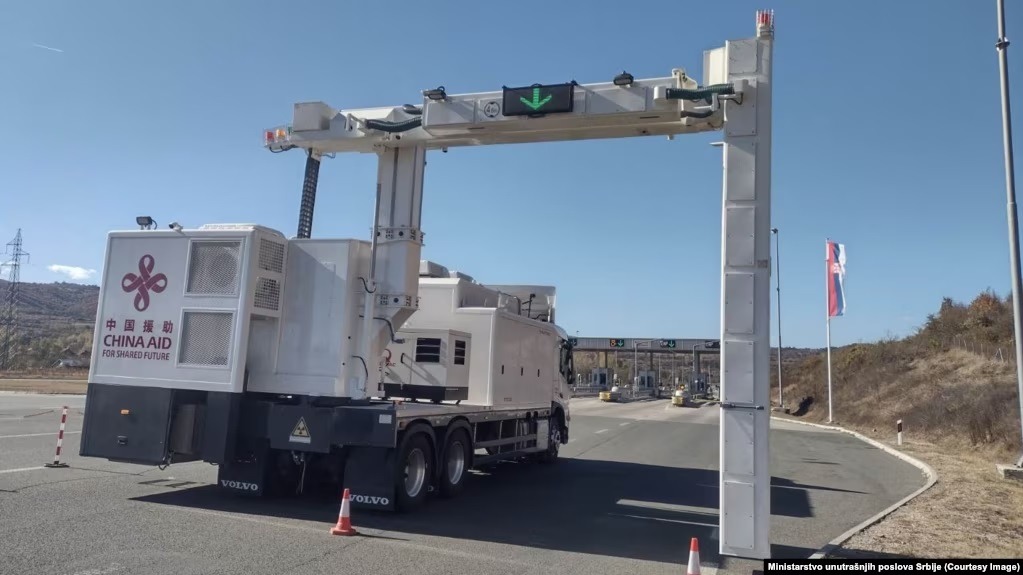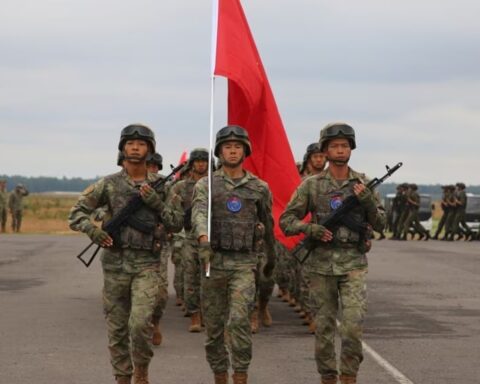BELGRADE — New mobile scanners donated by China to Serbia are raising new questions about the protection of personal data and transparency in how Belgrade is deploying Chinese technology along its borders.
Little information was shared about the October 29 donation beyond a statement by the Serbian Interior Ministry that the scanners “will enable more effective detection of illegal goods as well as people who are illegally transported” as cargo in cars and trucks across the country’s checkpoints. It added that the new Chinese technology is being deployed at the Gradinje border crossing with Bulgaria.
The ministry did not specify the value of the donated equipment or specify the manufacturer, but photos of the new scanners in place along the Serbian-Bulgarian border show that they are made by the Chinese company Nuctech, the world’s leading manufacturer of X-ray machines, scanners, and explosive-detection systems.
The firm has been blacklisted in the United States and restricted across the European Union due to connections to the Chinese Communist Party, complaints of it undercutting competitors in public tenders, and security concerns that China could gain access to sensitive government, industrial, and personal data by using the equipment.

This places Belgrade along a political fault line over the use of Chinese technology in critical infrastructure across Europe, with Serbia finding itself at odds with most EU member states.
“[The question is] whether [the scanners] are equipped with controversial technology that can collect and track data related to the movement of goods and passengers,” Ana Krstinovska, a researcher on China’s role in the Balkans at the China Observers in Central and Eastern Europe think tank, told RFE/RL. “Tightening regulations in China that require companies to share such data with the government, if asked, is the reason why Nuctech equipment is banned in some countries.”
The recent donation also comes amid a surge of migrants along the so-called Balkan Route where refugees pass through Serbia and its neighbors to enter the EU and claim asylum, which has become a growing political issue inside the Balkan country and across the 27-country bloc.
Data compiled by Frontex, the European border and coast guard agency, found that in the first four months of 2023 some 22,500 irregular border crossings were detected along the Balkan Route, making it the second most active path to the EU for migrants after the Mediterranean Sea.

In Serbia, the uptick in migrants has led to an increased police presence on border crossings and stepped-up security measures — something that has grown further following a shoot-out in October between migrants near the Serbian border with Hungary that killed three and injured one. Serbian police have raided the border zone on several occasions over the past several months, arresting suspected people smugglers and confiscating weapons.
In late October, Serbian President Aleksandar Vucic said Belgrade has considered using the military “to fix” security issues along the country’s borders.
The Interior Ministry did not respond to RFE/RL’s questions about for further details about the donated equipment, how it relates to increased migrant flows, and whether Nuctech meets European data safety standards.
Questions About Nuctech
Data security questions around the use of Nuctech’s equipment amid increased migration are not unique to Serbia.
The company first came under the scrutiny of EU lawmakers in 2020, when it emerged as a possible provider of airport security equipment used to screen people, baggage, supplies, cargo, and mail.
Following that, more than 50 members of the European Parliament asked the European Commission in 2022 to exclude the company from the tender for security reasons stemming from fears that Chinese authorities would gain access to travel and commercial information of other countries through Nuctech, which they said could threaten European security.
“The use of EU funds to further strengthen Nuctech’s presence in Europe’s critical infrastructure presents a unique opportunity for the company and the Chinese government to collect sensitive customs data that could be harmful to the commercial and security interests” of EU members, an open letter published in 2022 by the deputies stated.
Chinese President Xi Jinping has overseen a raft of legislation in recent years to bolster national security against perceived threats both domestically and outside China, focusing on national security and tightening control of data collection.
Nuctech did not respond to RFE/RL’s requests about data concerns related to its equipment, but the company has previously rejected such allegations, stating after the release of that letter that “all data generated by our devices belongs to Nuctech customers” and not to the company, EU countries, or the Chinese government.

Nuctech has close ties to China’s top leadership and was led by the son of former Chinese leader Hu Jintao. The Australian Strategic Policy Institute think tank found that Nuctech’s parent company is controlled by the state-owned China National Nuclear Corporation, which manages China’s civilian and military nuclear programs.
New Lines Drawn Across Europe
Scrutiny over Nuctech has grown at the country level across the EU, most notably in Belgium and Lithuania.
Lithuania reached an agreement with the Chinese company to supply baggage scanners for airports in the country, but canceled the contract in 2021 after the Lithuanian Defense Ministry raised national security concerns about Nuctech’s equipment and data issues, a ministry spokesperson told RFE/RL.
Belgium also decided earlier this year to exclude Nuctech from a tender to supply X-ray scanners for vehicles and containers at customs checkpoints in the country. The Belgian State Council sent RFE/RL a decision it reached rejecting Nuctech due to “national security” considerations.
In response to questions about the threats Nuctech’s equipment at borders and airports could pose, the European Commission told RFE/RL that they are unable to comment on individual companies, but that they have introduced a new “series of measures” that should guarantee the safety of customs-control equipment in the EU.
“Security requirements should be properly represented in selection criteria for awarding a contract and should take precedence over other criteria, such as price,” a commission spokesperson said.
The European Commission added that despite its recommendations, procurement decisions are ultimately the decision of individual member states and their governments.
According to publicly available tenders within the EU, Nuctech won two contracts this year: one to provide baggage-scanning equipment to the airport in Genoa, Italy, and another to supply a mobile X-ray scanner to Poland.
China And Serbia
Serbia has purchased Nuctech equipment in the past to operate along its borders, with the first acquisition of scanners in 2009. Nuctech also donated scanners to Serbia in 2020 amid the COVID-19 pandemic.
Belgrade has also made other purchases from the company since 2014 as part of a broader loan taken out from the Export-Import Bank of China. According to the current state budget, the Serbian government still owes Nuctech $9.1 million (8.6 million euros) for the equipment.

“At that time, neither Nuctech nor that kind of Chinese donation of equipment or loans was considered controversial,” Krstinovska said. “The Chinese side’s motivation was rather to promote their domestic companies, to help them penetrate the European market and secure further contracts.”
Krstinovska says these kinds of deals and the lack of details around them raise glaring transparency questions moving forward. In Serbia’s case, much of the Nuctech equipment has been purchased without an open-tender process.
“What is quite unique to China and also worrying is the use of loans that are tied to using Chinese companies and suppliers,” she adds. “The loans are eventually paid back. These are not gifts or investments, but taxpayers’ money, so there should be a proper procurement procedure to select the best value for money offer.”
Questions due to a lack of transparency in using Chinese technology and managing sensitive personal data are not only attached to Nuctech’s equipment in Serbia.
Following years of negotiations, Serbia began to install surveillance cameras made by China’s Huawei through a “Safe City” project for Belgrade. The government is currently in the process of introducing some 8,000 Huawei surveillance cameras that have facial-recognition capabilities, although authorities claim this feature is not yet being used.
Privacy concerns, coupled with a lack of public debate and regulation over the cameras’ use and deployment, has been a political flashpoint at times inside Serbia, sparking protests and tough political debates.
Similarly, an RFE/RL investigation earlier this year showed that Chinese-made surveillance cameras and accompanying software have been deployed in more than 40 cities and municipalities throughout Serbia, often without public consultation or public announcement.





